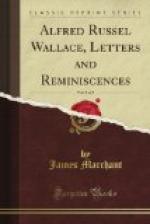* * * * *
Dr. Wallace was very fond of reading good novels, and usually spent an hour or two, before retiring to bed, with what he called a “good domestic story.” One of his favourite authors was Marion Crawford. Poetry appealed to him very strongly, and he had a good memory for his favourite verses, especially for those he had learned in his youth. Amongst his books were over fifty volumes of poetry.
He liked to see friends or interesting visitors, but he was rather nervous with strangers until he became interested in what they had to say. He enjoyed witty conversation, and especially a good story well told. No one laughed more heartily than he when he was much amused, and he would slap his hands upon his knees with delight.
He was very accessible to anyone who might have something to say worth hearing, and he had a great many visitors, especially during the last ten years of his life. Many people distinguished in science, literature, or politics called upon him, and he always enjoyed these visits, and the excitement of them seemed to have no bad effect upon him, even in the last year, when we sometimes feared he might be fatigued by them. In consequence of his sympathy with many heterodox ideas he frequently had visits from “cranks” who wished to secure his support for some new theory or “discovery.” He would listen patiently, perhaps ask a few questions, and then endeavour to point out their fallacies. He would amuse us afterwards by describing their “preposterous ideas,” and if much bored, he would speak of them as “muffs.” He was loath to hurt their feelings, but he generally ended by expressing his opinion quite clearly, occasionally to their discomfiture.
* * * * *
Dr. Littledale has contributed some reminiscences which may be introduced here.
“When I first met Dr. Wallace the conversation turned on the types of visitors that came to see him, and he gave us an amusing account of two young women who called on him to read through a most ponderous treatise relating to the Universe (I think it was). At all events the treatise proved, amongst other things, that Kepler’s laws were all wrong. Dr. Wallace was very busy at the time, and politely declined to undertake the task. I remember him well describing with his hands the size of this enormous manuscript and laughing heartily as he detailed how the writer of the manuscript, the elder of the two sisters, persistently tried to persuade him that her theories were all absolutely proved in the work, while the younger sister acted as a sort of echo to her sister. The climax came in a fit of weeping, and, as Dr. Wallace described it, the whole fabric of the universe was washed away in a flood of tears.




